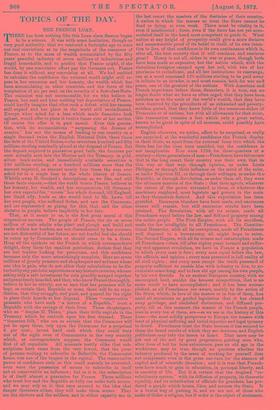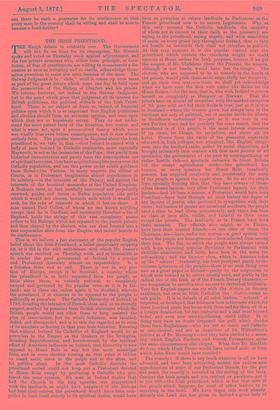TOPICS OF THE DAY.
THE FRENCH LOAN.
971E: E has been nothing like this Loan since finance began be a science. It was with some hesitation, though on very good authority, that we ventured a fortnight ago to state our real convictions as to the magnitude of the resources of France, as to the mass of wealth accumulated by the fifty years' peaceful industry of seven millions of industrious and frugal households, and to predict that France might, if she would, by one convulsive effort pay the Germans out. France has done it without any convulsion at all. We had omitted to calculate the confidence the external world might still re- pose in her resources and her honesty, the wealth which has been accumulating in other countries, and the force of the temptation of six per cent. on the security of a first-class State. The omission was not unreasonable, for we who believe in France, but read and hear nothing but depreciation of France, could hardly imagine that after such a defeat, with her ransom still unpaid and her place in the world still unvindicated, Europe, when asked for a loan which made financiers look aghast, would offer to place it twelve times over at her service. Of course the offer is in part unreal. Even this genera- tion, with its accumulations " surpassing the dreams of avarice," has not the means of lending to one country on a single demand twice the English National Debt, three times the debt of the United States,—the seventeen hundred and fifty millions sterling nominally placed at the disposal of France. Bat the deposit required to guarantee good faith, the fourteen per cent. actually sent into the Mairies and the Treasury, in gold, silver, bank-notes, and immediately available securities is 240 millions sterling, or a hundred millions more than the amount required, an amount nearly four times the sum ever asked for in a single loan in the whole history of finance. Whittle away M. Goulard's descriptions as we like, and still these facts remain,—that the world trusts France, believes in her honesty, her wealth, and her recuperation, till Germany, her own especial foe, "covers" her whole demand, till England, her timid ally, lends as she would lend to Mr. Lowe, till her own people, who suffered Sedan, and saw the Commune, and are represented as pining for this, that, and the other dictator in purple, believe implicitly in her fate.
That, as it seems to us, is the first great moral of this stupendous success. The people of France, the six or seven million of male adults who plant and plough and build and trade within her borders, are not disenchanted by her reverses, are not distrustful of her future, are not fearful lest she should be eaten up by Communists or should cease to be a State. Heap all the epithets on the French in which correspondents delight, deny them the smallest patriotism, declare that they are but traders looking for premiums, and this confidence becomes only the more astonishingly complete. Here are seven millions of greedy peasants and shopkeepers and artizans whose one idea is gain, who do not allow their calculations to be dis- turbed by any patriotic aspirations or any historic reveries, who are asking only a safe investment for coin greedily scraped together and penuriously hoarded, and they, who know France thoroughly, believe in her so utterly, are so sure that her promises will be kept, so certain that, Republic or none, there will be no repu- diation, that they struggle, and push, and quarrel for the right to place their hoards at her disposal. These "conservative " peasants, who have such " a horror of a Republic," trust a Republic with the savings of their lives. These shopkeepers, who so "despise M. Thiers," place their little capitals in the Treasury which he controls upon his first demand. These "timorous folk," who are so certain that the Commune will yet be upon them, rely upon the Commune for a perpetual 6 per cent., invest hard cash which they could bury out of the sight even of Communists in the very security which, as correspondents suppose, the Commune would first of all repudiate. All accounts testify alike that sub- scriptions have come from the very lowest, that the queue of persons waiting to subscribe in Belleville, the Communist home, was one of the longest in the capital. The conservative power of confidence such as this could scarcely be overrated, even were the possession of means to subscribe in itself not so conservative an influence ; but as it is, the subscription is of itself almost a guarantee for France. Those millions who trust her and the Republic so fully can make both secure, and we may rely on it, that once aroused to the idea that danger threatens either, they will make them secure. They are the electors and the soldiers, and in either capacity are in the last resort the masters of the destinies of their country. A nation in which the masses so trust the State cannot be. dead or dying, or even weak. There must be vitality in it, even if misdirected ; force, even if the force has not yet accu- mulated itself in the hand most competent to guide it. What- nation at any height of prosperity could give a more decisive• and unanswerable proof of its belief in itself, of its own inten- tion to live, of that confidence in its own continuance which is,. after all, the best security that it will continue, and continue- great? Money is not all, either in war or peace, though both have been made so expensive, but the nation which, with the• victorious foreigner camped upon her soil, with two of her provinces to revindicate, and all her institutions to rearrange,. can at a word command 120 millions sterling to be paid away in tribute to an invader, is and must remain, both for war an& peace, one of the greatest of the nations. With American an& French experience before them, financiers, it is true, can nn longer doubt what we have so often urged, that they have been. mistaken as to the scale of the world's wealth, that they have- been deceived by the precedents of an exhausted and poverty-- stricken period, that they know little of the resources either of: Treasuries or of nations, but with all allowances for that error, this transaction remains a feat which only a great nation,. known to be great in spite of all reverses, could possibly have accomplished.
English observers, we notice, affect to be surprised, or really- are surprised, at the wonderful confidence the French display- in their State, as apart from the external form into which the State has for the time been moulded, but the confidence is not inexplicable. Ever since 1798, for three-quarters of s century—three generations of men—Frenchmen have felt secure• that in the long resort their country was their own, that in. this way or that way, through opinion, as under Louis Philippe, or through their influence on the mind of the ruler, as under Napoleon III., or through their suffrages, as under the Republic, or through Revolution, as under them all, they were' the ultimate masters of the State ; that their agents, whatever the extent of the power entrusted to them, or whatever the machinery employed, must legislate aild govern in the main as they themselves desired. And this expectation has been gratified. Enormous blunders have been made, and enormous abuses still remain, but still enormous results have been, attained. The Revolution, with all its crimes, made all. Frenchmen equal before the law, and diffused property among. the entire people. The First Empire, with all its sacrifices,. made the law intelligible to all Frenchmen. The Constitu- tional Monarchy, with all its corruptions, made all Frenchmen well disposed to a bureaucracy all might hope to enter.. The Second Empire, with all its crimes and catastrophes, made all Frenchmen voters, till after eighty years' turmoil and suffer- ing and apparent revolution, we have in France a population in which every man is free ; every man equal before the law„ the officials, and opinion ; every man possessed in full reality of all civil rights ; and every man except the tenth possessed of property sufficient to enable him with industry to live, to ac- cumulate something, and to face old age among his own people, by his own fireside. In an ancient European country, with no unoccupied land, amidst the keenest competition, that is no mean result to have accomplished ; and it has been accom- plished, as all Frenchmen are aware, mainly by the action of the State, which, in love of the masses or in fear of them, has amid all mutations so guided legislation that it has cleare& away privilege, and abolished distinction, and diffused pro- perty, till at this moment the masses of the French people, nine in every ten of them, are—as we see in the history of this Loan—the most solidly prosperous in Europe, the masses with least of physical suffering and social injustice and legal tyranny to dread. Frenchmen trust the State because it has secured to them the broad results of which they are desirous, and English politicians may take the lesson to heart. That more may be- got out of the soil by great proprietors, guiding men who, after lives of toil for bare subsistence, pass an old age in the workhouse, may be true, though we question whether the industry produced by the sense of working for yourself does not compensate even in the gross out-turn for the absence of capital and of scientific direction ; and it is true that French- men have much to gain in education, in personal liberty, and in amenity of life. But it is certain that the despised "re- volutionary system," with its diffusion of property, its theoretic equality, and its substitution of officials for grandees, has pro- duced a people which trusts, likes, and secures the State. It is a brutal way of putting it, and we are not of those who make of Order a religion, but if order is the object of statesmen, can there be such a guarantee for its continuance as that every man in the country shall be willing and shall be able to become a fund-holder?



































 Previous page
Previous page